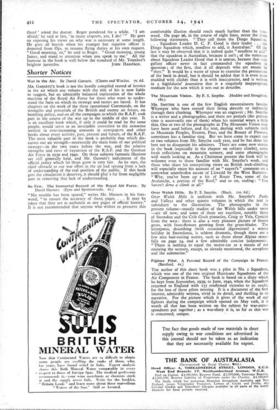Shorter Notices
War in the Air. By David Garnett. (Chatto and Windus. 7s. 6d.
MR. GaaNErr's book is not the hastily compiled record of heroics in the air which any volume with the title of his is now liable to suggest, but an admirably balanced explanation of the whole machine of the Royal Air Force for those who want to under- stand the facts on which its strategy and tactics are based. It has chapters on the work of the three operational Commands, on the strengths and potentials of the British and enemy air forces, on bombing policy, and on all the campaigns in which the R.A.F. took part in the course of the war up to the middle of this year. It is an excellent book which, if only it could be read by the same people, would serve as an invaluable corrective to the nonsense written in ever-increasing amounts in newspaprrs and other books about every activity, past, present and future, of the R.A.F. The most valuable part of the book is probably that which dis- cusses our air strength—necessarily the main basis of our political strategy—in the two years before the war, and the relative strengths and rates of expansion of the R.A.F. and the German Air Force in 1939 and 1940. On these subjests fantastic illusions are still generally held, and Mr. Garnett's indictment of the official policy which let them grow is very fair. As he says, the chief obstacle to our war effort in the air had sprung from a lack of understanding of the real position of the public. If this book gets the circulation it deserves, it should play a far from negligible part in removing that lack of understanding.


























 Previous page
Previous page